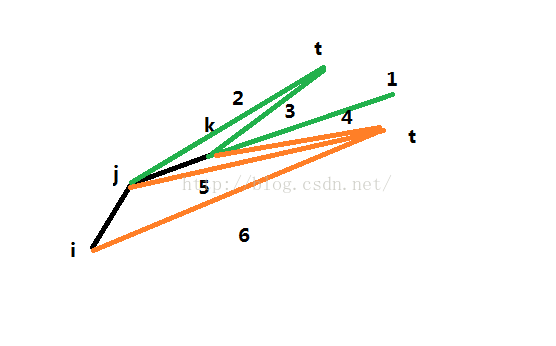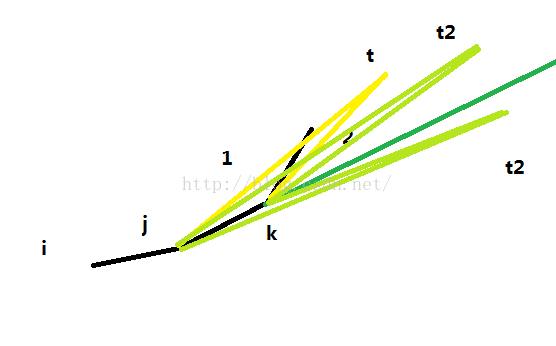hdu2993 斜率优化
MAX Average Problem
Time Limit: 2000/1000 MS (Java/Others) Memory Limit: 32768/32768 K (Java/Others)Total Submission(s): 4899 Accepted Submission(s): 1229
Problem Description
Consider a simple sequence which only contains positive integers as a1, a2 ... an, and a number k. Define ave(i,j) as the average value of the sub sequence ai ... aj, i<=j. Let’s calculate max(ave(i,j)), 1<=i<=j-k+1<=n.
Input
There multiple test cases in the input, each test case contains two lines.
The first line has two integers, N and k (k<=N<=10^5).
The second line has N integers, a1, a2 ... an. All numbers are ranged in [1, 2000].
The first line has two integers, N and k (k<=N<=10^5).
The second line has N integers, a1, a2 ... an. All numbers are ranged in [1, 2000].
Output
For every test case, output one single line contains a real number, which is mentioned in the description, accurate to 0.01.
Sample Input
10 6 6 4 2 10 3 8 5 9 4 1
非要自已写getint(),非常坑,这一题主要是,转化成斜率就好作了,用一个单调队列保存当前的最优解就可以了!我们可以发现,ans = min((sum[i] - sum[j])/(i-j));(sum[i] - sum[j])/(i-j)可以抽象看成斜率,那么每个数字可以看成一个点。如图如果,当前队列中有i,j,那么现在加入一个k,我们可以得出j是无效的,为什么呢? kij,表i,j的斜率 1:kik > kjk,所以这种情况下,j是无效的。 2:如果以后会出现一个t点,t在jk线的上方,那么2号线不如3号线,j是无效的,如果t 在jk线的下方,那么5号线不如6号线,j也是无效的。 所以综合以上情况j是无效的,直接从单调队列中除去。所以要统护如图样的一个向下凸的线。 如图二,目前,队列中有i,j,k这样三点成向下凸的线,目前出现了t点, 由于ktk > ktj > kti,所以把队头的i,j直接除去了,这样,会不会对以后的结果造成影响呢,其实,i,j不会有影响。 1,如果,以后的点有个t2在jk的上方,必然是kt2k更大,i,j无用,如果t2在j,k的下方,虽然kjt2 >kkt2,但由于,kjt2 < kjk < kkt,所以直接可以忽略i,j,对以后,不会有任何影响。通过这个图,我们也可以发现,点的横坐标是要递增,纵坐标也是要递增的,这也是能用斜率优化的前题,以后,这点,也是很有必要注意的。
Sample Output
6.50#include <stdio.h> #include <iostream> #include <string.h> using namespace std; #define MAXN 100005 struct node { double x,y; }q[MAXN]; int prime[MAXN],sum[MAXN]; double maxx; int getint() { char c; int sum; while(c=getchar()) { if(c>='0'&&c<='9') { sum=c-'0'; break; } } while(c=getchar()) { if(c<'0'||c>'9') { break; } sum=sum*10+c-'0'; } return sum; } double fmax(double a,double b) { if(a>b) return a; return b; } bool afterm(node a,node b,node c)/*后面的大返回真*/ { if((c.y-b.y)*(b.x-a.x)-(b.y-a.y)*(c.x-b.x)>0) return true; return false; } int main() { int n,k,i,s,e; node temp,current; while(scanf("%d%d",&n,&k)!=EOF) { memset(sum,0,sizeof(sum)); sum[0]=0; for(i=1;i<=n;i++) { prime[i]=getint(); sum[i]=sum[i-1]+prime[i]; } s=e=0;maxx=-1; for(i=k;i<=n;i++) { temp.y=sum[i-k]; temp.x=i-k; current.x=i; current.y=sum[i]; while(s<e&&!afterm(q[e-1],q[e],temp))/*保持斜率单调递增*/ { e--; } q[++e]=temp; while(s<e&&afterm(q[s],q[s+1],current))/*新加的斜率比头要大,去掉头*/ { s++; } maxx=fmax(maxx,(double )(current.y-q[s].y)*1.0/(current.x-q[s].x)); } printf("%.2f\n",maxx); } return 0; }

